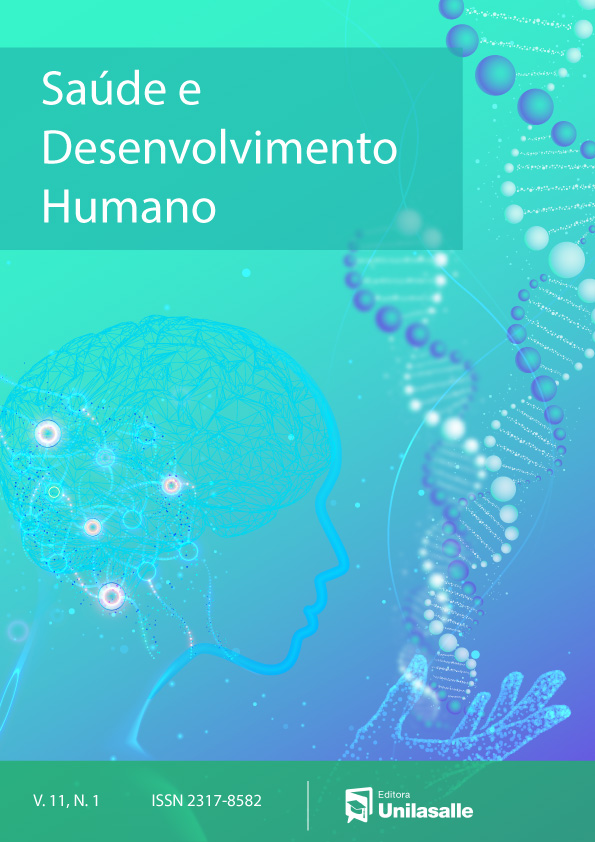Gestational weight gain in triplet, trichorionic and triamniotic pregnancy: experience report with a case.
DOI:
https://doi.org/10.18316/sdh.v11i1.9399Palavras-chave:
gestational weight gain, pregnancy, high risk, triplet, prematurity.Resumo
Introduction: inadequate weight gain during pregnancy is recognized as a risk factor for unfavorable maternal and perinatal outcomes, such as preeclampsia. Reports focusing on weight gain in triplet pregnancies are scarce in the literature.
Aim: to achieve the evolution of gestational weight gain and the maternal and perinatal outcomes of a triple pregnancy case.
Description of case: in the present experience report, the case of a triplet, trichorionic and triamniotic pregnancy was presented. The patient in the case, 36 years old, started prenatal care at 12 weeks of gestation and pre gestational nutritional diagnosis of grade I obesity. The total gestational weight gain was 21 kg, agreed according to the current recommendation. The case presented gestational diabetes mellitus and preeclampsia. However, surgical delivery took place at 32 weeks and 6 days and the newborns had adequate weight for gestational age, without serious clinical complications.
Conclusions: the observed results reinforce the importance of nutritional monitoring and the need for more studies that address weight gain in triplet pregnancy.
Referências
Brasil. Ministério da Saúde. Gestação de Alto Risco Manual Técnico [Internet]. Gestação de Alto Risco Manual Técnico. 2012. 370–373 p. Available from: http://bvsms.saude.gov.br/bvs/publicacoes/gestacao_alto_risco.pdf
Brasil. Ministério da Saúde. Informações de Saúde: Estatísticas vitais – mortalidade e nascidos vivos. [Internet]. [cited 2021 Jan 10]. Available from: http://tabnet.datasus.gov.br/cgi/tabcgi.exe?sinasc/cnv/nvuf.def
Elster A, Bleyl J, Craven T. Birth weight standards for triplets under modern obstetric care in the United States, 1984-1989. Obs Gynecol. 1991;77(3):387–93.
Fennessy KM, Doyle LW, Naud K, Reidy K, Umstad MP. Triplet pregnancy: Is the mode of conception related to perinatal outcomes? Twin Res Hum Genet. 2015 May 21;18(3):321–7.
Rajan P, Murki S, Vavilala S, Surubhotla N. Maternal and Early Perinatal Outcomes of Triplet Pregnancy: Study of 82 Triplets from a Single Perinatal Centre in South India. J Obstet Gynecol India. 2018;68(3):179–84.
Luke B, Bryan E, Sweetland C, Leurgans S, Keith L. Prenatal Weight Gain and the Birthweight of Triplets. Vol. 44, Acta Genet Med Gemellol. 1995.
Eddib A, Penvose-Yi J, Shelton JA, Yeh J. Triplet gestation outcomes in relation to maternal prepregnancy body mass index and weight gain. J Matern Neonatal Med. 2007;20(7):515–9.
Luke B. Nutrition in multiple gestations. Vol. 32, Clinics in Perinatology. 2005. p. 403–29.
Institute of Medicine (IOM). Weight gain during pregnancy: reexamining the guidelines. Rasmussen KM Y AL, editor. Washington (DC): National Academies Press (US); 2009. 868 p.
Luke, B; Nugent, Clarck; Ven, Cosmas van de; Martin, Dibe; O’Sullivan, Mary Jo; Eardley, Sandra; Writter, Frak R; Mauldin, J; Newman RB. The association between maternal factors and perinatal outcomes in triplet pregnancies. Am J Obstet Gynecol. 2002;187(3):752–7.
INTERGROWTH-21. Standards and Tools [Internet]. 2021 [cited 2021 Jan 4]. Available from: https://intergrowth21.tghn.org/standards-tools/
Soares l MR, Silva B, Almeida C, Justiniano B. Complicações materno-fetais de gestações gemelares,. Rev Cad Med. 2019;2(1):74–87.
Al-Shukri M, Khan D, Al-Hadrami A, Al-Riyami N, Gowri V, Haddabi R, et al. Maternal and Fetal Outcomes of Triplet Gestation in a Tertiary Hospital in Oman. Sultan Qaboos Univ Med J. 2014;14(2):e204-210.
Torloni M, Kikuti M, Costa M. Gestação Trigemelar Espontânea: Complicações Maternas e Resultados Perinatais. RBGO. 2000;22(7):413–9.
Curado J, Antonio F, Papageorghiou A, Bhide A, Thilaganathan B, Hilaganathan B, et al. Perinatal mortality and morbidity in triplet pregnancy according to chorionicity: systematic review and meta-analysis. Ultrasound Obs Gynecol. 2019;54(5):589–95.
Downloads
Publicado
Edição
Seção
Licença
Autores que submetem seus manuscritos para serem publicados nesta revista concordam com os seguintes termos:
- Autores mantêm os direitos autorais e concedem à revista o direito de primeira publicação, com o trabalho simultaneamente licenciado sob a Licença Creative Commons Attribution que permite o compartilhamento do trabalho com reconhecimento da autoria e publicação inicial nesta revista.
- Em virtude dos artigos aparecerem nesta revista de acesso público, os artigos são de uso gratuito, com atribuições próprias, em aplicações educacionais e não-comerciais.
- Os autores concordam com os termos da Declaração de Direito Autoral, que se aplicará a esta submissão caso seja publicada nesta revista (comentários ao editor podem ser incluídos a seguir). E que anexam declaração assinada que todos os autores leram o documento a ser submetido e que aceitam os termos desta revista.

Os trabalhos publicados na Revista Saúde e Desenvolvimento Humano de ISSN 2317-8582 está licenciado com uma Licença Creative Commons - Atribuição-NãoComercial 4.0 Internacional.
Baseado no trabalho disponível em http://revistas.unilasalle.edu.br/index.php/saude_desenvolvimento/.


